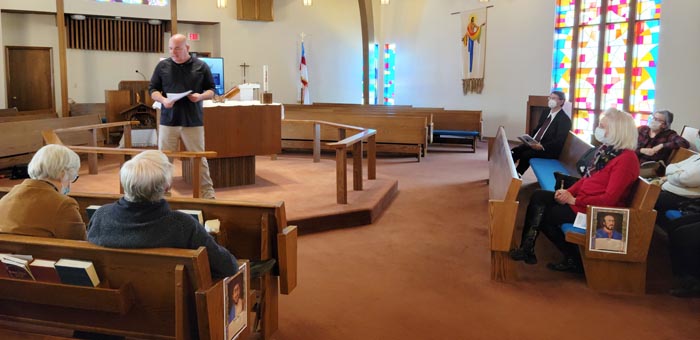
Retired Davenport police officer Hank Jacobsen talks about human trafficking during a prayer service Jan. 23 at St. Alban Episcopal Church in Davenport.
By Anne Marie Amacher
The Catholic Messenger
DAVENPORT — Retired Davenport police officer Hank Jacobsen told attendees at the Attacking Trafficking prayer service on Jan. 23 that human trafficking is pervasive and that they need to trust their gut instincts to report suspicions of it.
The prayer service at St. Alban Episcopal Church opened with Pastor Kerry Jennings’ call to prayer. Jane Campagna led the reading of psalms and the Canticle of Simeon. The gathering sang “The Cry of the Poor” while watching a video about human trafficking.
Jacobsen, who worked 22 years for the Davenport Police Department, spent part of that time working in the crime-stopping division, which included human trafficking. The Department of Homeland Security defines trafficking as modern-day slavery that involves the use of force, fraud or coercion to obtain some type of labor or commercial sex act. Minors and adults are victims. “It is insane how big this is getting,” he said.
The internet and social media have contributed to the growing number of people being trafficked. Young people, particularly, are vulnerable to online luring, Jacobsen said. It often starts with someone becoming the youth’s “friend.” A vulnerable youth often has low self-esteem, wants attention and receives it from the new friend who offers praise and a listening ear. An offer to meet in person for a meal or to go out of town follows. The friend draws in the youth with money, food, clothing and other items before pulling the youth into trafficking. Many times the young person ends up in the sex industry, Jacobsen said.
He told of a case in which a trafficker took two youths, one from Kentucky and the other from Indiana, to Clinton, Iowa. They managed to escape to Davenport. An attentive store clerk realized something was wrong, asked the youths questions and then called 911. “You will struggle to get answers,” Jacobsen said. However, he encouraged people to go with their gut instinct even if they are not sure trafficking is involved. In this case, both girls were eventually able to go home.
The other part of trafficking is forced labor. Several years ago, Jacobsen said police raided various massage parlors. Although it is tough to prosecute human trafficking cases because witnesses often do not want to testify, he said law enforcement looks for other ways to prosecute. Charging massage parlors for not having a license to give massages is one example.
Jacobsen encouraged parents to “track your kids. There are a lot of creepy people out there.” It’s hard once they leave and are lured into trafficking to come back. “Trafficking is about money…. We are a selfish society. We don’t care what happens to anyone else. But this does affect you.” A child is being abused.
“We need to help each other. We need to be nosy and ask questions. We cannot turn our backs (on those who may be in trouble),” he said. However, do not “put yourself in a position to get hurt,” if you suspect human trafficking. “Call 911. Let us do the work.”
You can also call the national trafficking hotline at 1-888-373-7888. “Report what you know, including possible car description and license plate. Listen with your ears, watch with your eyes.”
Signs of possible trafficking may include disconnection from family, dramatic behavior changes, inconsistency in stories, teenagers hanging out with or dating adults, or bragging about money when the teenagers do not have a job or the job would not pay a high wage.
Jacobsen encouraged everyone to learn more about human trafficking. “Talk about it with others. Do your research.” To learn more about Attacking Trafficking, visit attackingtrafficking.org or email attackingtrafficking@gmail.com











